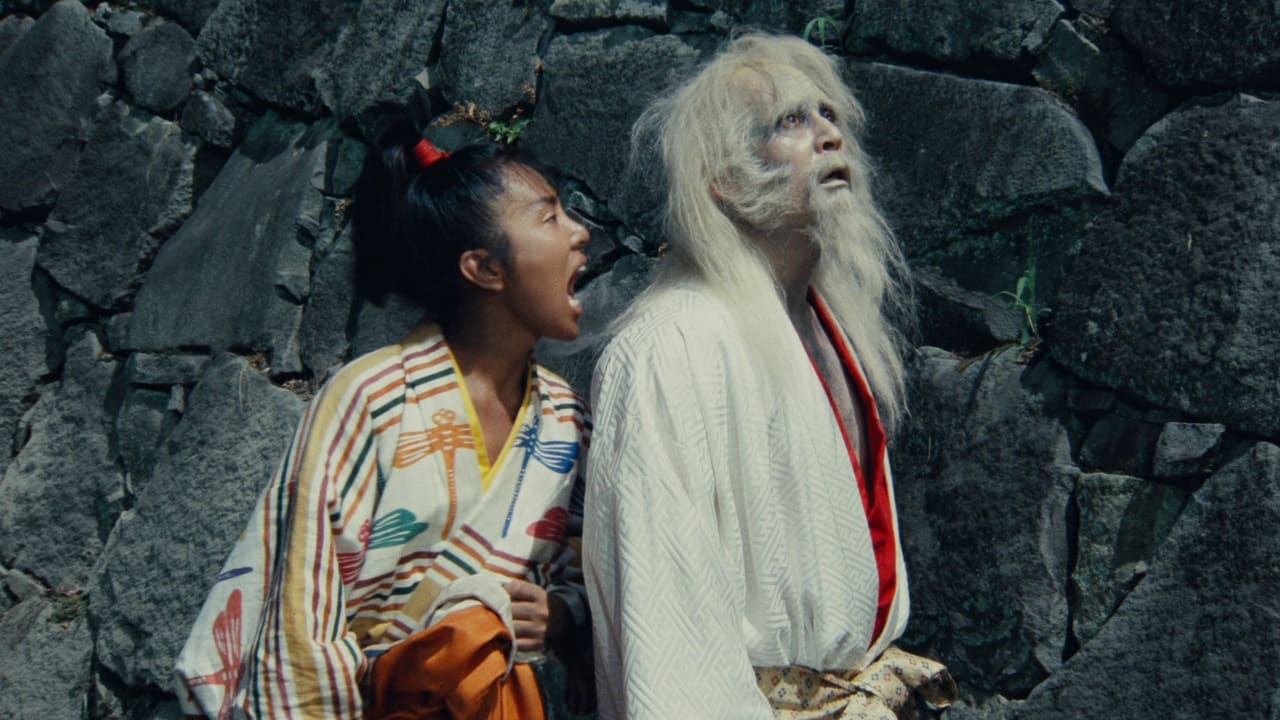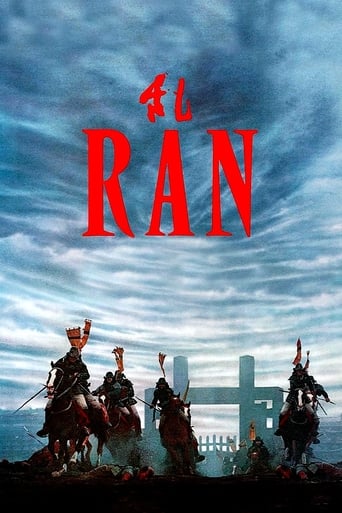

Really Surprised!
... View MoreAmateur movie with Big budget
... View MoreThe film creates a perfect balance between action and depth of basic needs, in the midst of an infertile atmosphere.
... View MoreThe film never slows down or bores, plunging from one harrowing sequence to the next.
... View MoreFilm Review: "Ran" (1985)Direcotor Akira Kurosawa (1910-1998) conquers the classic written by William Shakespeare (1564-1616) as another tragedy of "King Lear" firstly published and put to the stage in 1605, when translation into medieval feudalism-indulging Japan makes a motion picture classic in visual-striking production and costume design by Emi Wada to fulfill the story of Warlord Hidetora Ichimonji, performed by actor Tatsuya Nakadai, whose character leaves behind a kingdom with a fully-equipped military army in sword, spear and flags-of-property showing to his three incapable-to-rule sons throwing a region of inceptional tranquility and elegance into chaos, while the eldering warlord retreats in going mad at rural hide-out countryside location in amazingly-received impressionistic make-up-effects in favors for director Kurosawa, who shows impeccable as expressionistic genius in fulfilling a cinematic masterpiece in chamber-play as open-range war-scenarios after 160 minutes to a just blitz personalized feeling of mine to watch the film all over again.Copyright 2018 Cinemajsty Entertainments LLC
... View MoreThe acting is great, the cinematography is breathtaking, the visuals are neat, the costumes and sets are well designed, and brilliantly takes Shakespeare's original "King Lear" story and tell it a new and interesting way. Definitely worth the watch.
... View MoreOne of Kurosawa's best, "Ran" is a story set on samurai era Japan that touches on different subjects, as for example family, power, revenge or betrayal, delivering a powerful movie that will stay for a long time with the viewer.Old Lord Hidetora Ichimonji is getting old and, when a couple of lords come to ask for his third son to marry one of the lord's daughters, Hidetora decides it is time to retire. He will divide his territories between his three sons and retire, even though he will keep his title and some power. The youngest, Saburo is against this decision, but the older two brothers are really happy with their father's decision and promise to take care of him. Saburo is sent away, stripped from all of his possessions and Hidetora starts his new life.What follows is a story of hate, betrayal, desire, corruption... You know, the stuff of great stories. The two older brothers start to plot against each other and against their father, the wife of the older brother too, Saburo just seems to worry about his father... There are a lot of threads but Kurosawa does an amazing job in threading them and keep the plot advancing while making things more and more interesting. The plot is full of nice twists and touches, and the characters are well rounded, their behavior and decisions well justified and presented. Kurosawa was a great director, and every frame of this movie is a clear example of his touch. Everything is really great, from the music to the palette of color, and even the use of the scenery is also top notch.Totally worth seeing, "Ran" is a movie about the dangers of power. Any kind of.
... View MorePut simply, this is an excellent Samurai version of Shakespeare's King Lear. To be fair if you combine Shakespearean tragedy with Samurai swords, medieval castles and fuedal savagery, you can't really go too far wrong.This was produced and directed by Akira Kurosawa, the most beloved of all Japanese filmmakers. His work is much more accessible than arguably Japan's finest ever film director, Ozu. This is probably Akira Kurosawa's most popular film after Yojimbo and Sanjuro. This is one of the few Akira Kurosawa films shot in color. This movie can also lay claim to the fact that George Lucas and Steven Spielberg ponied up the dough to fund and release it to a worldwide audience. That almost made up for Howard the Duck and 1941.If you're not familiar with the story of King Lear, here is the deal. It's finally time that an aging senile king must divide up his kingdom between his three daughters. Two are conniving moles whose tongues only ever drip honeyed platitudes to their Father. Since they tell him what he wants to hear, he hands them the largest pieces of his royal pie, while the third, the honest and pious but bluntly speaking youngest daughter is pushed to the side. Being the wisest, she bides her time, fully expecting her older sisters to annihilate one another and ready to step in to salvage whatever is left of her Father's kingdom, whom she only wants to preserve in order to honour her ailing father. Clearly the tragedy is that her Father should have chosen her over her nasty cold hearted siblings.So swap that for an aging Samurai lord and his three Male heirs and you basically get the idea. To complicate that family tragedy, old enemy armies stand at the border, massing to attack his land, while the old senile fool is dithering over who gets to eat pie and who gets stand in the shadows. This is one excellent samurai action war film. It's a good primer in getting acquainted with the art and story telling of sensei Kurosawa, himself an actual member of the Samurai class, so it is something of a poignant thing for him to tell stories purely exploring the national character of both feudal and modern Japan.I own the bluray version of this movie and the picture is stunning.
... View More